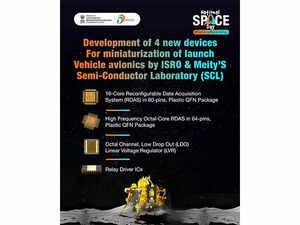Science
India Advances Space Self-Reliance with Indigenous Integrated Circuits

The Indian Space Research Organisation (ISRO) has taken a significant step towards enhancing self-reliance in space technology by developing four new indigenous integrated circuits (ICs) in collaboration with the Ministry of Electronics and Information Technology’s (MeitY) Semi-Conductor Laboratory (SCL). This initiative aims to power the avionics of India’s launch vehicles, ultimately reducing reliance on imported electronics.
The newly developed ICs include a 16-Core Reconfigurable Data Acquisition System (RDAS), a High-Frequency Octal-Core RDAS, an Octal Channel Low Drop Out (LDO) Linear Voltage Regulator (LVR), and Relay Driver ICs. These advancements are expected to lower launch costs and decrease the size of avionics hardware, marking a pivotal move in India’s space capabilities.
SCL, based in Chandigarh, has a history of building world-class space processors. The VIKRAM1601, a 16-bit processor, has been utilized in ISRO’s launch vehicles since 2009. A notable milestone was reached on March 5, 2025, when ISRO received the first production lots of the advanced 32-bit microprocessors developed for space applications, namely the VIKRAM3201 and KALPANA3201. These processors represent a substantial technological leap.
The VIKRAM3201 is recognized as India’s first fully indigenous 32-bit microprocessor, qualifying for use in the extreme conditions faced by launch vehicles. Fabricated at SCL’s 180nm CMOS semiconductor facility, it is an upgraded version of the 16-bit VIKRAM1601. Meanwhile, the KALPANA3201 is a 32-bit SPARC V8 RISC microprocessor, designed for compatibility with open-source software toolsets and has been rigorously tested with flight software. Named after the late Indian astronaut Kalpana Chawla, it is tailored for mission-critical applications.
India’s Expanding Space Landscape
National Space Day, celebrated every year on August 23, commemorates India’s successful Chandrayaan-3 mission, symbolizing the country’s growing stature in space exploration. India’s space journey has evolved beyond ISRO, with a surge of private startups emerging since the sector was opened to private companies in 2020. These startups are driving innovations in rocket launches, satellite technology, and Earth observation, positioning India as a formidable player in the global space arena.
Notable achievements include Skyroot Aerospace, which made history with its Mission Prarambh, marking the first private rocket launch from Sriharikota, reaching an apogee of 89.5 km. The company has also successfully test-fired the second stage of its Vikram-1 rocket and developed the Kalam-1200, the largest propulsion system crafted by India’s private sector.
Another remarkable innovation comes from Agnikul Cosmos, which achieved the world’s first rocket flight using a 3D-printed engine. Their Agnibaan SOrTeD Launch showcased the first semi-cryogenic engine developed in India and utilized a private launchpad named Dhanush.
The realm of Earth observation has also been transformed by Pixxel Space India, which launched the Firefly Constellation, featuring the world’s highest-resolution commercial hyperspectral satellites. These satellites can capture data across more than 150 spectral bands with a swath width of 40 km.
Future Aspirations and Government Support
The advancements in India’s space sector are supported by the government, with Finance Minister Nirmala Sitharaman announcing a venture capital fund of Rs 1,000 crore during her July 2024 budget speech. This investment aims to expand the space economy fivefold over the next decade.
India has set ambitious goals, including establishing the Bharatiya Antariksha Station by 2035 and sending the first Indian astronaut to the Moon by 2040. The country’s inaugural human space mission, the Gaganyaan programme, is progressing towards its first human flight, scheduled for the first quarter of 2027. These projects follow the successful landing of Chandrayaan-3 on the Moon’s South Pole and the solar mission Aditya-L1.
India’s strategic focus on self-reliance in space technology, bolstered by innovative private enterprises and government support, is shaping a promising future for the nation’s space ambitions. As the landscape continues to evolve, India is poised to make significant contributions to global space exploration and technology.
-

 World5 months ago
World5 months agoSBI Announces QIP Floor Price at ₹811.05 Per Share
-

 Lifestyle5 months ago
Lifestyle5 months agoCept Unveils ₹3.1 Crore Urban Mobility Plan for Sustainable Growth
-

 Science4 months ago
Science4 months agoNew Blood Group Discovered in South Indian Woman at Rotary Centre
-

 World5 months ago
World5 months agoTorrential Rains Cause Flash Flooding in New York and New Jersey
-

 Top Stories5 months ago
Top Stories5 months agoKonkani Cultural Organisation to Host Pearl Jubilee in Abu Dhabi
-

 Sports4 months ago
Sports4 months agoBroad Advocates for Bowling Change Ahead of Final Test Against India
-

 Science5 months ago
Science5 months agoNothing Headphone 1 Review: A Bold Contender in Audio Design
-

 Top Stories5 months ago
Top Stories5 months agoAir India Crash Investigation Highlights Boeing Fuel Switch Concerns
-

 Business5 months ago
Business5 months agoIndian Stock Market Rebounds: Sensex and Nifty Rise After Four-Day Decline
-

 Sports4 months ago
Sports4 months agoCristian Totti Retires at 19: Pressure of Fame Takes Toll
-

 Politics5 months ago
Politics5 months agoAbandoned Doberman Finds New Home After Journey to Prague
-

 Top Stories5 months ago
Top Stories5 months agoPatna Bank Manager Abhishek Varun Found Dead in Well









